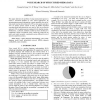Free Online Productivity Tools
i2Speak
i2Symbol
i2OCR
iTex2Img
iWeb2Print
iWeb2Shot
i2Type
iPdf2Split
iPdf2Merge
i2Bopomofo
i2Arabic
i2Style
i2Image
i2PDF
iLatex2Rtf
Sci2ools
104
click to vote
ICASSP
2009
IEEE
2009
IEEE
Voice search of structured media data
This paper addresses the problem of using unstructured queries to search a structured database in voice search applications. By incorporating structural information in music metadata, the end-toend search error has been reduced by 15% on text queries and up to 11% on spoken queries. Based on that, an HMM sequential rescoring model has reduced the error rate by 28% on text queries and up to 23% on spoken queries compared to the baseline system. Furthermore, a phonetic similarity model has been introduced to compensate speech recognition errors, which has improved the end-to-end search accuracy consistently across different levels of speech recognition accuracy.
Related Content
| Added | 21 May 2010 |
| Updated | 21 May 2010 |
| Type | Conference |
| Year | 2009 |
| Where | ICASSP |
| Authors | Young-In Song, Ye-Yi Wang, Yun-Cheng Ju, Mike Seltzer, Ivan Tashev, Alex Acero |
Comments (0)

